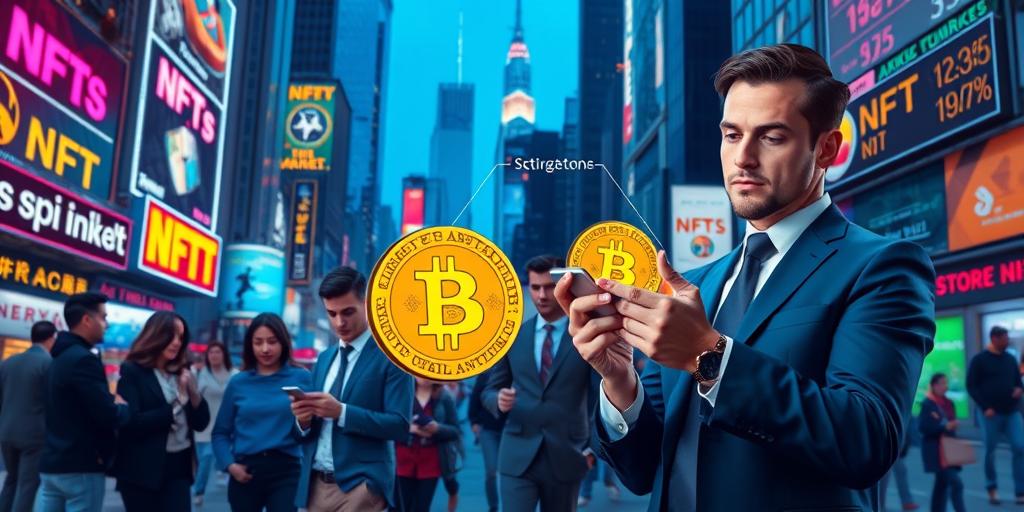Digital assets are rapidly changing the way we think about ownership and value, and they’re poised to have a major impact on the 2024 economy. The emergence of non-fungible tokens (NFTs) has sparked a revolution, blurring the lines between the physical and digital worlds.
NFTs and Digital Assets: A New Era of Ownership
The rise of digital assets is a testament to the growing importance of the digital realm. But what exactly are these assets, and how are they shaping the future of the economy?
What are NFTs?
NFTs, or non-fungible tokens, are unique digital assets that represent ownership of something. Unlike traditional digital assets like cryptocurrencies, NFTs are not interchangeable. Each NFT is one-of-a-kind, making them valuable for representing ownership of digital or physical assets. Think of them as digital certificates of authenticity, proving ownership of a specific digital item like a piece of art, a video game item, or even a virtual piece of land.
The Rise of Digital Assets
The rise of digital assets goes beyond just NFTs. Cryptocurrencies, like Bitcoin and Ethereum, have already established themselves as a new form of digital currency. But the potential of digital assets extends far beyond just financial instruments. These assets are becoming increasingly integrated into various aspects of our lives, from art and entertainment to real estate and finance.
The Impact of NFTs on the 2024 Economy
The impact of NFTs on the 2024 economy is undeniable. They’re not just a passing fad; they’re fundamentally changing how we interact with the world and how value is created.
Transforming Industries
NFTs are already having a significant impact on various industries, creating new opportunities and transforming traditional business models.
Art and Collectibles
NFTs have revolutionized the art world, giving artists a new way to sell their work directly to collectors, bypassing traditional galleries and intermediaries. This has empowered artists and democratized the art market, opening it up to a wider audience. The ability to track ownership and provenance through NFTs also adds a new level of authenticity and transparency to the art world.
Gaming and Entertainment
NFTs are transforming the gaming industry by introducing new ways to own and trade in-game items. Players can now own unique digital assets that they can use in different games, or even sell on secondary markets. This creates a new level of engagement and ownership for gamers, and it also creates new revenue streams for game developers.
Real Estate and Finance
NFTs are also starting to have an impact on the real estate and finance industries. They can be used to represent ownership of physical properties, creating a more efficient and transparent system for buying and selling real estate. NFTs are also being used to create fractional ownership of assets, making it easier for individuals to invest in real estate and other valuable assets.
New Business Models and Opportunities
The rise of NFTs is creating new business models and opportunities across various sectors. From decentralized marketplaces to digital asset management platforms, new companies are emerging to capitalize on the growth of the NFT market.
Economic Growth and Innovation
The widespread adoption of NFTs and digital assets is expected to drive significant economic growth and innovation. As these technologies mature, they have the potential to create new jobs, stimulate investment, and drive technological advancements across various industries.
Challenges and Considerations
While the future of NFTs and digital assets looks bright, it’s important to acknowledge some of the challenges and considerations that need to be addressed.
Volatility and Risk
One of the biggest challenges facing the NFT and digital asset space is volatility. The value of these assets can fluctuate rapidly, and investors need to be aware of the risks involved.
Regulation and Legal Frameworks
Another important challenge is the lack of clear regulatory frameworks for NFTs and digital assets. Governments and regulators are still grappling with how to best regulate these new technologies, and this uncertainty can create challenges for businesses and investors.
Environmental Concerns
NFTs have been criticized for their environmental impact, as the process of creating and trading them can consume a significant amount of energy. As the NFT market continues to grow, it’s important to find ways to reduce the environmental footprint of these technologies.
The Future of NFTs and Digital Assets
The future of NFTs and digital assets is full of possibilities. As these technologies continue to evolve, they are poised to play an even bigger role in shaping the world around us.
The Metaverse and Web3
NFTs are playing a crucial role in the development of the metaverse, a virtual world where people can interact and conduct business. NFTs can be used to represent ownership of virtual assets, like land, buildings, and avatars.
Decentralized Finance (DeFi)
NFTs are also finding their way into the world of decentralized finance (DeFi). DeFi protocols are using NFTs to create new financial products and services, such as NFT-backed loans and insurance.
The Evolution of Ownership and Value
The rise of NFTs and digital assets is challenging our traditional notions of ownership and value. As the digital world becomes increasingly integrated into our lives, the concept of ownership will likely evolve to encompass both physical and digital assets.
Embracing the Digital Revolution
The rise of NFTs and digital assets represents a significant shift in how we interact with the world. It’s a revolution that is creating new opportunities and reshaping existing industries. While there are challenges and considerations to be addressed, the potential of these technologies is undeniable. By embracing the digital revolution, we can unlock a new era of innovation, growth, and economic prosperity.




